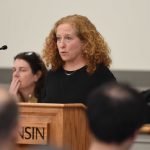Choice Schools Still Being Debated
New study says voucher students do better. Except on achievement.
Wisconsin’s first-in-the-nation Parents’ Choice program using tax funds to pay tuition for students in private schools is back in the news in ways good and bad.
The good news: A new study by two professors found that Milwaukee students in Choice schools are happier in those schools, more likely to graduate and enroll in college, and less likely to be convicted of crimes.
The bad: Despite decades of studies in Milwaukee and across the nation, there is still no clear evidence that Choice students do better on achievement tests, the report added.
In Washington, U.S. Education Secretary Betsy DeVos last week clashed with Wisconsin Congressman Mark Pocan over Milwaukee’s Choice program. DeVos was defending her agency’s request for cuts in aid to public schools nationwide but $1.4 billion more for choice programs, including $250 million more for private and religious schools.
The Milwaukee Journal Sentinel reported that, on 2015-16 tests, only two percent of students at one Milwaukee Choice school, Right Step, were proficient in math and no students were proficient in English.
Pocan asked if DeVos would send one of her children to Right Step, the Journal Sentinel reported. DeVos demurred, saying “I really applaud Milwaukee for empowering parents to make the decisions that they think are right for their students and their children.”
Pocan called Wisconsin’s Choice program a “failed experiment” and complained that the last expansion of vouchers resulted in three-fourths of the public money going to parents whose kids were already enrolled in those private schools, and two-thirds went to families making over $100,000 a year, as The Capital Times reported.
Wisconsin’s first Choice program was signed into law by Republican Gov. Tommy G. Thompson in April 1990. It let only 341 poor Milwaukee-area students attend seven non-religious private schools. Choice followed years of controversies over how to improve failing MPS schools.
Five years later, Thompson got the Legislature to expand Choice to church-run schools – a change that allowed it to expand to 32,700 students who this year attend about 260 private schools in Milwaukee, Racine and statewide.
They concluded: “A movement that began in Gov. Thompson’s office in 1987 and the Wisconsin Legislature in 1990 has been the most important fundamental change in education since the desegregation efforts of 1960s and 1970s.”
Witte and Wolf found that Choice students feel better about those schools and graduate “from high schools and attended four-year colleges at 4 and 7 percentage point higher rates” than MPS students. Choice high school grads are more likely to have careers and “solid family structures,” the professors added, while dropouts are more likely to spend time in jail, be single parents and be drug or alcohol dependent.
A group of 2006 Milwaukee Choice students stayed in college about eight months longer than MPS graduates, the study said.
The report also said parents enrolled their kids in Choice schools believing they would learn more, the schools were safer, there was more classroom discipline and better teachers. As a result, Choice parents were “considerably” more involved in school-related activities.
But, the study noted, “The evidence in support of the various forms of school choice increasing test scores is decidedly mixed…School choice interventions demonstrate their clearest positive effects on non-cognitive outcomes such as attainment, civic values and crime reduction.”
“My personal opinion is that these results are more important than performance on standardized tests,” Witte added. “The test scores, of which there are many, do not show consistent differences between Parents’ Choice students and MPS students.”
Scott Jensen, the former Assembly speaker and Thompson aide who is now a senior advisor to the American Federation for Children, which promotes Choice nationally, also said there are factors more important than test scores.
“The best academic studies all agree that the students attending voucher schools in Milwaukee are more likely to graduate from high school and go on to college than their peers at MPS,” Jensen said. “As a result, the students in voucher schools are more likely to succeed in life.”
When legislators writing the next state budget act on K-12 school funding, they must decide how much faster Choice in Wisconsin should grow.
Steven Walters is a senior producer for the nonprofit public affairs channel WisconsinEye. Contact him at stevenscwalters@gmail.com
The State of Politics
-
A Wisconsin Political Trivia Quiz
 Dec 15th, 2025 by Steven Walters
Dec 15th, 2025 by Steven Walters
-
The Fight Over Wisconsin’s House Districts
 Dec 8th, 2025 by Steven Walters
Dec 8th, 2025 by Steven Walters
-
The Battle Over On-Line Betting
 Nov 24th, 2025 by Steven Walters
Nov 24th, 2025 by Steven Walters






















“two-thirds of Choice families had household incomes of more than $100,000,”
WOW! That absolutely wrong and misleading. two-thirds of all families who claim a gross income deduction for private school tuition have incomes over 100k. NOT two thirds of all choice students have families with incomes over 100k. There’s a big difference between a family getting a couple hundred dollars deducted from their taxes vs taxpayer money being used to pay the full tuition at a private or charter school.
AG, thank you for pointing out this egregious error, it has been corrected. Our apologies for it.
More than 80% of the voucher money is going to religious schools. I don’t want tax dollars being used to preach religion to children.
John, I am sure the state will allow you to open up a “godless” learning institution. Unfortunately, for you many families taking advantage of this choice are Hispanic, African lineage, and Islamic. Their lives are centered around their faith. I
You mean students perform better when they have “solid family structures” and involved parents? NOOOOOO!!!
That has zero to do with voucher schools and everything to do with the parents themselves. In fact, it’s telling that vouchers don’t do better than public schools, despite the fact that the parents of voucher kids are involved enough to try something that they think will work better vs public schools, who have some parents who are either absent or indifferent to their kids’ educations.
Add in the fact that 3/4 of new voucher students were already attending private schools (meaning taxpayers are giving a straight subsidy to the religious school), and the fact that voucher schools literally take away money from the local public school, and it’s well past time to end this failed experiment.
Or why don’t we just end this madness and do like they do in Canada – you indicate the number of school-age children on your census and tax forms. And then EVERY child gets a voucher for the exact same amount which the parents use for any school of their choice, be it public, private, religious, or whatever.
No more argument. No more treating some schools like they’re better than others. No more pitting faith-based against private against public.
Jake beat me to it. I don’t think the family involvement and parent’s interest in education has ever actually been considered. Not sure the visible results are actually a result of the choice school itself if academic proficiency is essentially the same.
The two authors of this study are ardent school choice supporters and one (Wolf) receives funding from Walmart, also an ardent supporter of school choice.
Authors are both highly suspect in regards to objectivity of this report. Checkout their backgrounds.